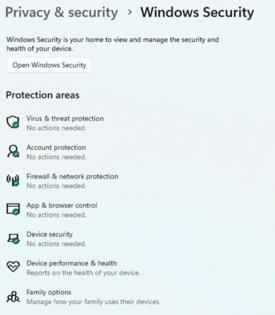Do you really need separate antivirus software? Probably not
Published in Science & Technology News
I had a conversation with a friend the other day at the gym. He is buying a new Windows PC and he’s thinking of investing in new antivirus software, and he asked me what I used for antivirus software.
He had his last PC for more than 10 years and he had been using one of the large antivirus suites that was charging him by the year.
Companies like Norton, McAfee, AVG and Bitdefender have antivirus and security solutions that can help keep your PC safe, but those features overlap with a lot of the features of Windows’ built-in Defender product.
If you search for recommendations for the best antivirus suite, you’ll find a lot of lists.
Likewise, if you search for, “do I need antivirus software,” you’ll find some pretty good arguments that you can go without it.
I think you need to examine your individual use case as you shop for antivirus and security software.
My personal recommendation is most home users really do not need to pay for antivirus or security software.
Microsoft and Apple provide built-in antivirus solutions. Browsers like Google Chrome and others do a really good job of warning you when you’re wading into dangerous territory online. Email providers like Google and Microsoft and Yahoo scan your email for dangerous attachments.
If you’re running Windows 11 (and you do need to be running Windows 11), you can go to your Settings and then Privacy and Security and then Windows Security to see a dashboard of the different security categories monitored by Windows Security.
If you click the Virus & Threat Protection, you’ll see the last scan and results as well when the virus definitions were last updated. There are red, yellow and green status icons for each section, so you can see at a glance any areas that need your attention. Just make sure you keep current with updates.
Likewise for Apple computers. Just keep current on your operating system and security updates from Apple.
What happens if you click on something in a browser and you start getting strange pop-ups or web pages redirect you to some scammy ad page? That can happen, and for those instances, I download and use Malwarebytes, which can scan and repair your system when you suspect you’ve clicked on something bad.
Malwarebytes has a free version (for Mac or Windows), and you should try it if you need it. I do recommend paying for it if you need it on a regular basis, but I don’t recommend leaving it installed on your computer. When I’ve had to use it, I’d load it, run it and let it clean up and then uninstall it.
I just don’t think any software that’s running on your system and doing largely the same thing as the built-in security software is a good thing. In my experience, third-party live antivirus protection apps can and do slow things down.
I fully expect many of you will disagree with me, and I don’t mind. Erring on the side of caution is not a bad thing.
If you use your computer for a small business, or you make your living using your computer, you may feel safer with a security suite installed. I don’t have a problem with you using any software that helps you feel safer online.
©2025 Tribune Content Agency, LLC.







Comments